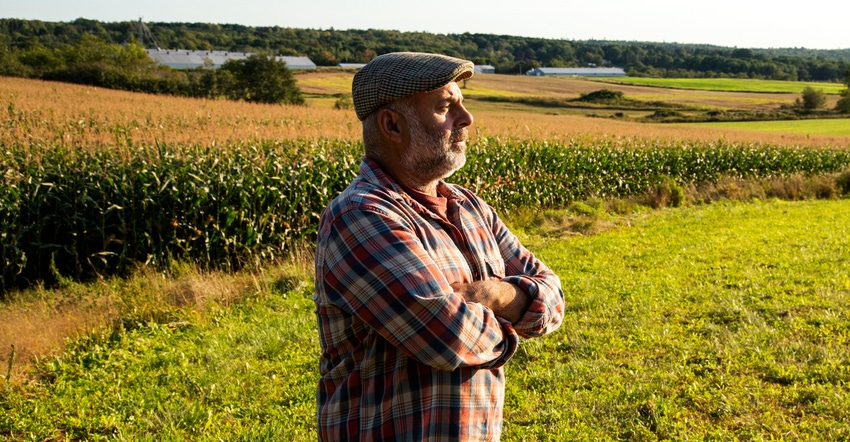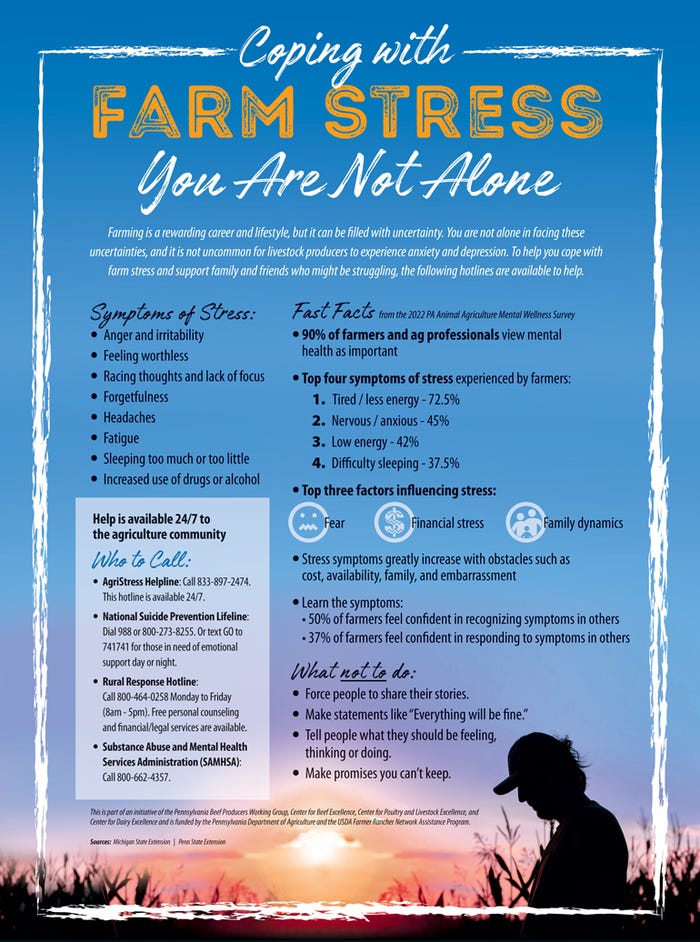August 19, 2022

I’m an advocate for mental health. I’ve had — and still do have — my own struggles with mental health, and I’m not afraid to talk about it.
So, when I saw that a group of ag groups in Pennsylvania had done a survey of farmers to gauge their experiences and attitudes toward mental health, I was thrilled. This is an issue that doesn’t get enough attention, although I think it’s getting more attention than it has in the past.
At this year’s Ag Progress Days, a breakfast meeting was held to talk about the results of the Pennsylvania Animal Agriculture Mental Wellness Survey. I couldn’t attend because I had some prior commitments, but I did talk to Ginger Fenton, Penn State dairy Extension educator, who said that the meeting was attended by more than 100 people, and that people were engaged in the topic.
That’s great. If you didn’t make it, check out the graphic below. It shows some interesting data, including the fact that 90% of farmers and ag professionals viewed mental health as important.

Delving deeper into the results, I saw some things that really stood out, both positive and negative.
First off, out of the 7,862 surveys that were sent out to farmers — 329 were sent out to ag industry professionals — only 7.5% (570 surveys) were returned. That’s disappointing.
Fenton says the fact that the surveys were sent out between Dec. 11, 2021, and Jan. 31 of this year — over the holiday season — may have played a factor. It was also sent out by multiple livestock groups, so given the fact that many producers raise multiple forms of livestock, some producers may have gotten multiple surveys mailed to them.
Still, that participation number isn’t good.
Financial stress, weather, and long hours and conditions were the top three stressors farmers reported. I was a little surprised by this. I can understand that financial stress was the biggest stressor — it is for lots of people — but other stressors like fear of losing the farm or not having enough labor ranked low. Maybe this is a sign of resilience. I don’t know. Interpret the data as you wish.
Another question asked to what degree various things — such as the COVID-19 pandemic, relationship issues, uncertain future or fear of losing the farm — affected their mental health. This is where farmers answered slightly different. Financial issues, again, ranked at the top, but facing an uncertain future and losing the farm ranked close behind.
I was surprised to see that social isolation, which many people think can contribute to depression issues, ranked low. I guess the farmers who returned the survey like to be alone, or maybe they are just so busy that they don’t even think about it.
And for your information, the COVID pandemic ranked low in this part of the survey, too.
Overwhelmingly, farmers talk about their mental health most with their spouse, 72%, or with a family member, 57%, with friends ranking high on that list, too. This, to me, shows the importance of having close relationships and not shutting out the people closest to you if you need help.
But the fact that cost and embarrassment were ranked as the biggest obstacles to farmers seeking treatment is troubling to me. Farmers aren’t cash rich. I understand that, but money shouldn’t be an obstacle to getting help. If you need help, you should be able to get it, regardless of how much money you have.
Also, embarrassment really bothered me, too. No one should be embarrassed to talk about how they feel. I understand the feeling of thinking that I’m tough and I’ll get through it, but sometimes this isn’t enough. And you shouldn’t feel embarrassed reaching out to someone. The stigmas around mental health are gone now.
If you need someone to talk to or are going through a crisis, here’s a list of resources:
Farm Aid Hotline: 1-800-FARM-AID • 1-800-327-6243
National Suicide Prevention Lifeline: 1-800-273-TALK (8255)
AgriStress Helpline: 833-897-AGRI (2474)
Crisis Text Line: 741741
Plain Communities Helpline (Green Pastures): 717-989-8661
Preventsuicidepa.org: 2-1-1
Emergency call: 9-1-1
Farm Safety Check: umash.umn.edu
mentalhealthamerica.net/mental-health-screening-tools
As I’ve said before, no one deserves to suffer alone.
You May Also Like




